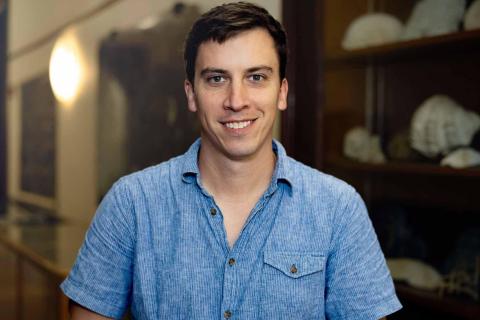Thomas DeCarlo
Assistant Professor

Education & Affiliations
Biography
Dr. Thomas DeCarlo is an oceanographer whose research focuses on the resilience and vulnerability of coral reef ecosystems in the face of climate change. His work combines field expeditions, laboratory analyses, and advanced imaging techniques to understand how ocean warming, acidification, and biogeochemical processes impact coral growth and survival. DeCarlo has conducted research across the globe—from the Great Barrier Reef to the Red Sea and the Pacific Islands—using coral cores as natural archives to reconstruct centuries of ocean conditions.
Before joining Tulane University, Dr. DeCarlo served as an Assistant Professor of Oceanography at Hawai‘i Pacific University and completed postdoctoral research at the University of Western Australia and the Red Sea Research Center at KAUST. He leads Tulane’s Sclerochronology Lab, which develops innovative approaches to forecast coral bleaching and assess reef health under accelerating climate stress.
Courses
EENS-3600 Climate Data and Analysis
EENS-3661 Chemical Oceanography
Research
Research Areas:
Coral Reefs, Anthropogenic Climate Change, Ocean Dynamics, Coastal Biogeochemistry, and Ocean Acidification.
Research Overview:
Dr. DeCarlo oversees the Sclerochronology Lab, which focuses on understanding how reef environments are responding to anthropogenic pressures. Current research projects include:
- Global-scale analyses of coral growth histories using skeletal cores
- Investigating coral reef hydrodynamics with unmanned aerial vehicles
- Studying coral reef microclimates
- Advancing oyster reef restoration efforts in Louisiana
The lab emphasizes open science, developing practices to make datasets not only accessible but also easily usable by other researchers and for K–12 outreach initiatives.
Contributions
Henley B.J., McGregor H.V., King A.D., Hoegh-Guldberg O., Arzey A.K., Karoly D.J., Lough J., DeCarlo T.M., & B.K. Linsley (2024). Highest ocean heat in four centuries places Great Barrier Reef in danger. Nature 632, 320-326.
Whitaker H.V. & T.M. DeCarlo (2024). Re(de)fining Degree-Heating Week: Coral Bleaching Variability Necessitates Regional and Temporal Optimization of Global Forecast Model Stress Metrics. Coral Reefs.https://doi.org/10.1007/s00338-024-02512-w
Mantanona H.C. & T.M. DeCarlo (2023). Coral growth persistence amidst bleaching events. Limnology and Oceanography Letters 8, 734-741. https://doi.org/10.1002/lol2.10340
Chen W-H., Ren H., Chiang J.C.H., Wang Y-L., Cai-Li R-Y, Chen Y-C., Shen C-C., Taylor F.W., DeCarlo T.M., Wu C-R., Mii H-S., & X.T. Wang (2023). Increased tropical South Pacific western boundary current transport over the past century. Nature Geoscience 16, 590-596. 10.1038/s41561-023-01212-4
DeCarlo T.M., Carvalho S., Gajdzik L., Hardenstine R.S., Tanabe L.K., Villalobos R., & M.L. Berumen (2021). Patterns, drivers, and ecological implications of upwelling in coral reef habitats of the southern Red Sea. Journal of Geophysical Research – Oceans 126, e2020JC016493.
DeCarlo T.M. (2020). Treating coral bleaching as weather: a framework to validate and optimize prediction skill. PeerJ8, e9449.
DeCarlo T.M., Gajdzik L., Ellis J., Coker D.J., Roberts M.B., Hammerman N.M., Pandolfi J.M., Monroe A.A. & M.L. Berumen (2020). Nutrient-supplying ocean currents modulate coral bleaching susceptibility. Science Advances 6, eabc5493.
DeCarlo T.M. & H.B. Harrison (2019). An enigmatic decoupling between heat stress and coral bleaching on the Great Barrier Reef. PeerJ 7, e7473.
DeCarlo T.M., Harrison H.B., Gajdzik L., Alaguarda D., Rodolfo-Metalpa R., D’Olivo J., Liu G., Patalwala D., & M.T. McCulloch (2019). Acclimatization of massive reef-building corals to consecutive heatwaves. Proceedings of the Royal Society B 286, 20190235.
